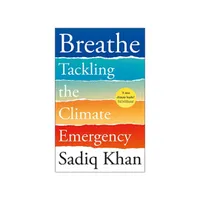Sadiq Khan: "Climate change is happening here and now - but the key message is that there's hope for the future"

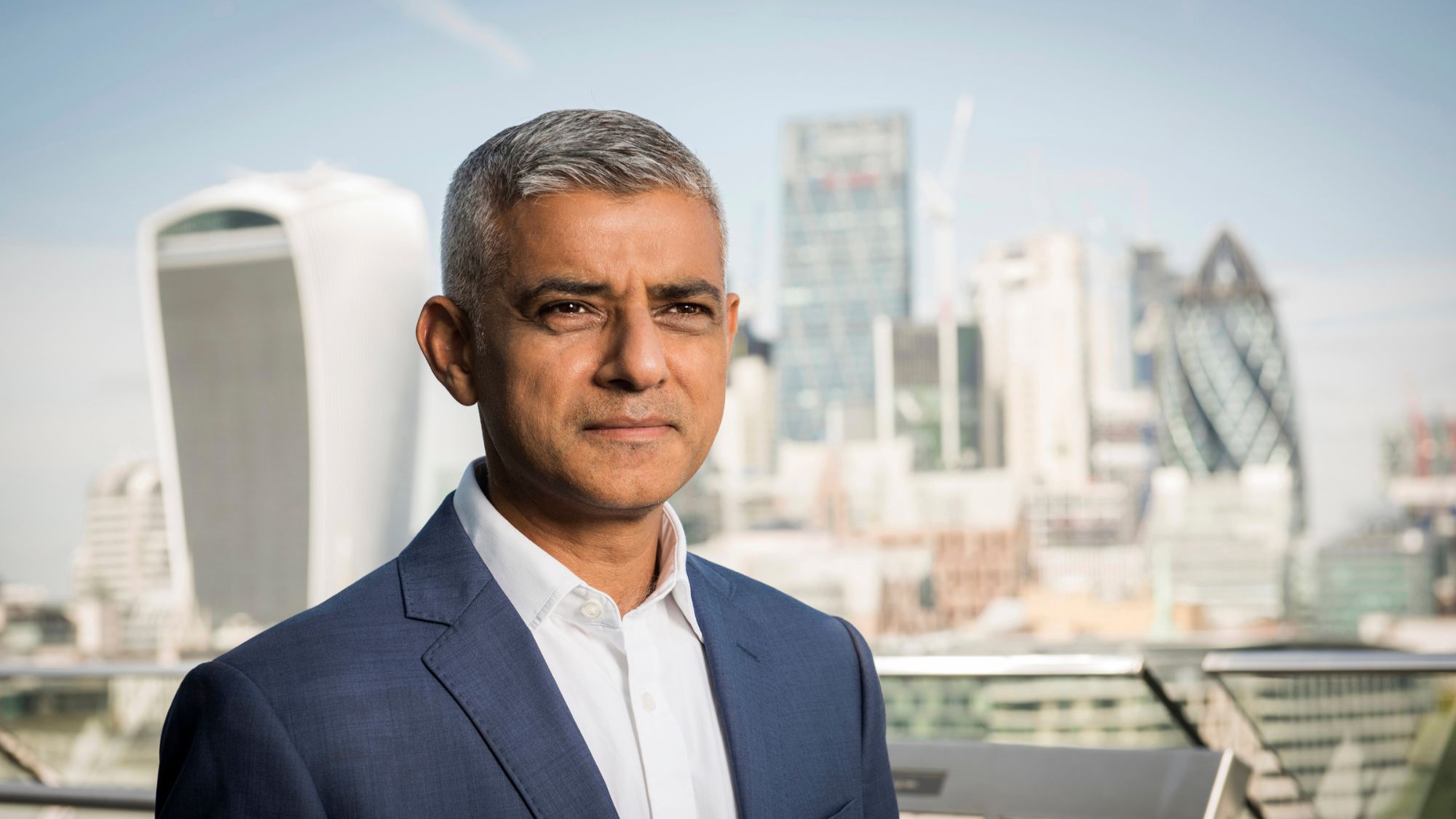
Celebrity news, beauty, fashion advice, and fascinating features, delivered straight to your inbox!
You are now subscribed
Your newsletter sign-up was successful
As he becomes one of the first politicians to publish a book while serving, the Mayor discusses the small steps we can all make towards building a better tomorrow.
Sadiq Khan is one of the most prominent global politicians advocating for green issues. Since becoming Mayor of London in 2016, he's put the fight against climate change and air pollution front and centre - declaring a climate emergency, introducing the world's first Ultra-Low-Emission Zone, and committing to make London net zero-carbon by 2030.
That said, it hasn't been an easy journey, something Khan told Marie Claire UK this week as he released his debut book, Breathe: Tackling the Climate Emergency.
Breathe is an urgent call to action told through Khan's own journey, with the Mayor only learning the extent of the climate crisis after developing health issues from exposure to air pollution aged 43. But it is also an uplifting handbook, providing solutions to the barriers he's facing on his mission to make London greener and also small, actionable changes that we can all make on an individual level.
"The key message I hope people take from Breathe is that there's hope for the future," Khan told us. "It is possible for us to tackle climate change and air pollution, and you can be a part of that."
Features Editor Jenny Proudfoot sat down with Sadiq Khan ahead of Breathe's release to discuss the climate emergency, sustainable advice and the challenges of writing a book while serving as a politician. Do scroll our guides to greenwashing, intersectional environmentalism, and sustainable living, while you're here.
Sadiq Khan on global warming, air pollution, and building a better tomorrow
Let's start at the catalyst for your engagement in action against air pollution...
Celebrity news, beauty, fashion advice, and fascinating features, delivered straight to your inbox!
So I'm a progressive politician - I used to be a human rights lawyer, so one of the "good guys", right? Notwithstanding all that, I drove a Land Rover Discovery in London, and when I was a member of Parliament I voted to have a new runway at Heathrow Airport.
But in 2014, something remarkable happened. I thought I was doing something that was good, healthy and worthy which is to run the London Marathon - to raise lots of money for charity, and to get fit and healthy. And I did run the London Marathon, I did raise lots of money for charity, and importantly I beat Ed Balls - that’s a very important part of the story. But a few months later I discovered that I wasn't as healthy as I was before I started training. What I discovered shocked me - I had developed adult-onset asthma, becoming sick from breathing in the air in a city that I love.
When the experts explained to me that this was quite common now, my mind boggled. I started to find out a bit more about what is actually going on, and I discovered that over a period of time air has been getting worse. Things that cause climate change cause air pollution - but it is reversible.
And you yourself did the transition from Land Rover owner to an "electric bike evangelist"…
It’s true. I drove a Land Rover Discovery - I was that guy, the guy who thought I was being clever. When I became a Partner, I negotiated a parking space for my Sub Convertible on the same road as the office, right? Because I drove to work even though the tube connections are fantastic.
I've made the journey from that to where I am now because of selfish reasons - I discovered how it affected me. I don’t want people to think that this is a political book, a book for activists, or a book for think tanks - this is a book for everyone. To see that actually change is quite easy - if Sadiq can do it, anybody can.

Sadiq Khan after finishing the London Marathon in 2014
You also speak in the book about Ella Roberta Adoo-Kissi-Debrah...
The final part of the jigsaw for me was discovering the case of Ella. This is a nine-year-old child who through no fault of her own suffered regular asthma attacks leading ultimately towards her losing her life. Her mother Rosamund and her family have looked into what exacerbated it, and it was all man-made - Ella's death was preventable. It's heart-breaking and we don't need more cases like hers.
Do you think parenthood has made you more engaged in your activism, raising two children in London with air pollution being what it is?
I've always tried to be empathetic towards people like me - people from my background. People who’ve been unfairly dismissed, people treated badly by the police, or people who had issues because of who they were - their gender, their race, their religion, their sexuality, whatever.
When I discovered the story of Ella and Rosamund, a number of things struck me. One of them was that Rosamund could be my parent. My asthma is nowhere near as bad as Ella's but if I start panicking when I get an asthma attack or when I'm out of breath and wheezing, what was poor Ella going through as a child? Throw into the equation the fact that I’m a parent now - I’ve got my children, I’ve got nephews and nieces, I've got people that I love who live in London and all around the country.
I can do something about it, and if you can, you've got to do something about it. You don't need to be the Mayor to do this stuff, you don't need to be Greta Thunberg. All of us can do something about this.
Did that drive your decision to run for Mayor of London?
I was frustrated with the role I had as a parliamentarian. You know being a member of parliament you've got to stay in your lane - you've got to know where you are in the hierarchy and there's a limited amount you can do. When the opportunity came to run to be the Mayor of London with the powers that it brings and the change you can make, it was a no-brainer.
Let's talk about redefining the environmental crisis as a health crisis...
One of the things I’ve realised is that when people think of climate change, they think of it happening “over there” - in Sub-Saharan Africa, Bangladesh, or Islands in the West Indies. Or if it is happening to us, that it's in 30, 40 or 50 years' time.
Actually, it's an “us” issue and it's a “now” issue, and I think people need to recognise that. No matter which part of the country you're in or where you live, you're affected by climate change and air pollution. It's leading to not just around 4,000 premature deaths in London, but tens of thousands of premature deaths around the country, children with stunted lungs forever and adults with a whole host of health issues.
We're calling it a health crisis not only because it's a fact, but it's also a tactic. Because an environmental crisis gives the impression of altruism - “tomorrow”, “then”, “nice to have”. A health crisis is “me”, “us”, “now”.
What are some actionable changes that everyone can make to be more environmental?
It’s the simple things. I'm not saying we've all got to adopt a vegan diet and get rid of our cars, but there are little things we can do which incrementally lead to big changes.
There's an amazing stat that two-thirds of journeys in our city could be done by walking or cycling - just think about that. Try to reuse or as my daughters call it, “pre-love”. Check the quality of the air so you can avoid certain roads when you need to - especially if you're a runner or a cyclist. Don't leave the tap running unnecessarily, don't leave the lights on, and don't leave your car idling - these things all make a difference. We've shown in London that we can bring about good change in a short period of time.

Sadiq Khan in parliament
As the serving Mayor of London, how did you find the time to write this book?
Yeah, you should speak to my wife - she was not happy when I told her I was doing this. I mean, as it is I work seven days a week, and so I built in time late into the night, so rather than having six hours of sleep each night, it's been five. I used my holidays, too - I spent a lot of last Christmas writing the book. Finding the time has been one of the biggest challenges, but the good thing is, because I wrote it in real-time while being the Mayor, it's fresh. I don’t have to go back and do research, it's all happening in front of me. I’ve never read a book written by somebody who's still in a position of power and influence - President Obama wrote his book when he stopped being President Obama, right? A lot of those books are great, but they’re historical. So as hard as it was, I think Breathe's USP is that it was a book written in real-time by a serving politician in a position of power and influence.
What has been the biggest challenge of writing Breathe?
The biggest challenge was pressing send and waiting for the response. When I used to be a lawyer, the most difficult part was when the case was finished - the judge goes out, the jury goes out and you're just waiting. The space between pressing send and publication feels like that.
But you can’t be precious. We've all read books from politicians, and I love politicians - some of my best friends are politicians, but a lot of it is self-serving and egotistical. So I didn’t want it to be that sort of book - it’s not a political memoir.
Similarly, I didn’t want it to be a book where I'm not being honest. Because there were challenges and it wasn’t an easy ride. I wanted to tell my story about what it has been like persuading even my own tribe of progressives that this is a big issue. And what I've tried to do in each chapter is not just show you the problems. Fatalism - “nothing we can do about it”, apathy - “doesn’t really affect me”, cynicism - “politicians are all the same”. But to also explain the solution and how we address the issue. Because it hasn't been easy and it is a battle, but you can win it.
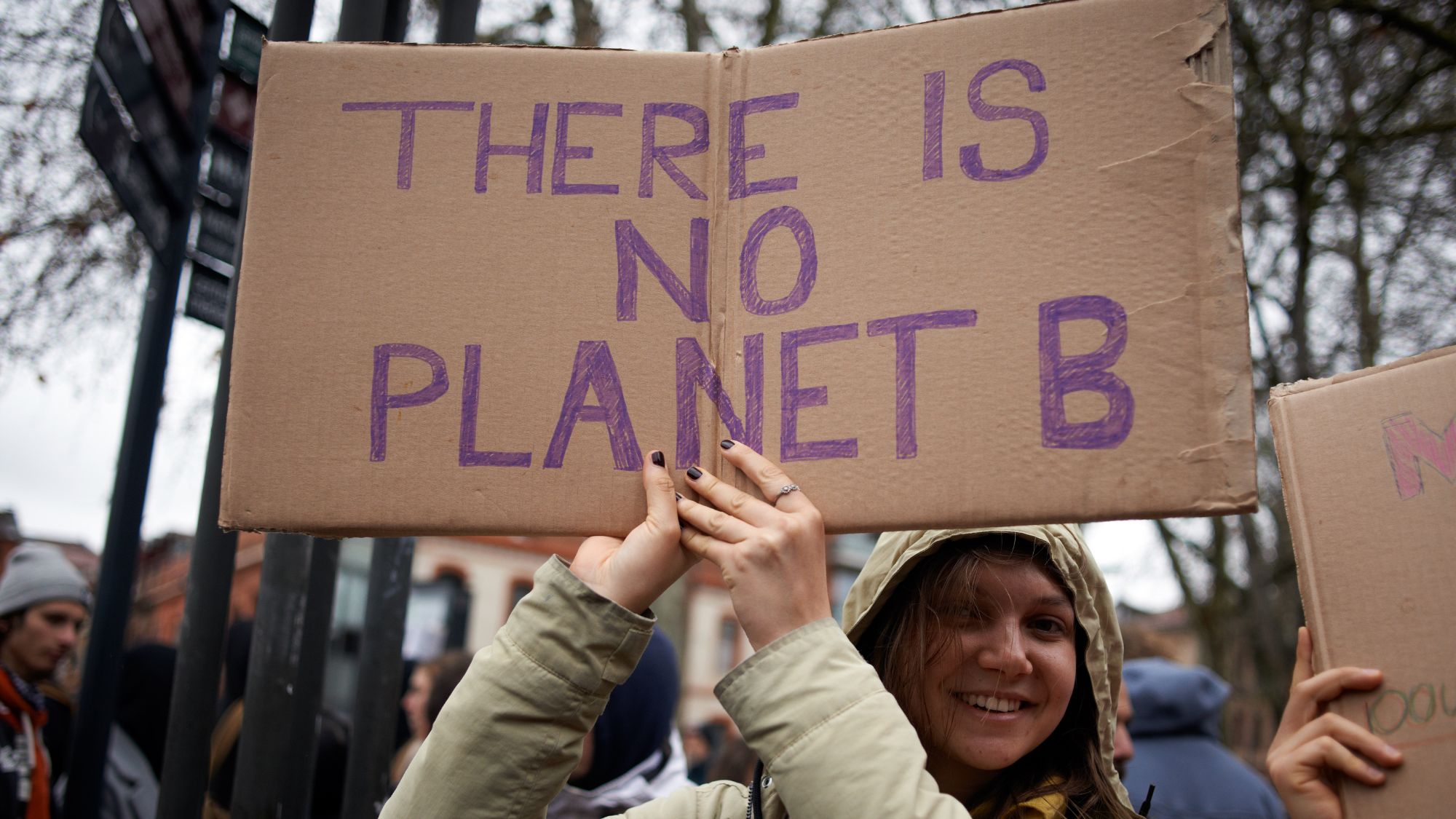
Climate change protesters in London
The cost of living crisis has obviously made it more difficult for people to be greener because they just can’t afford it…
The first point to make is that on a London scale, climate change in air quality proportionately affects the poorest people more than the wealthy people. So those least likely to own a car suffer the worst consequence of air pollution from those who own the car. The borough in our country with the largest amount of four-wheel drive vehicles is the Royal Borough of Kensington and Chelsea. They have one of the highest life expectancies because they drive their vehicles not in their patch but outside their patch. So it's an issue of social justice and racial justice. And so we've got to make it easy for people.
What can be done about that?
It's a good question. In the Ultra Low Emission Zone we've got a massive scrappage scheme to support those families making the transition. In the first five years of me being Mayor I froze the fares to make transport affordable in London. We're talking to employers to make it as easy as possible for them to support their employees if they want to jog or cycle into work with shower facilities, cycle-to-work schemes, and so forth. In terms of housing, we’re supporting people insulating their homes, which is reducing your bills. These actions deal with climate change, but they also deal with the cost of living crisis. And if we were to invest in solar panels, wind turbines etc., we would have renewable energy, but we would also be energy secure. So if there's an invasion of Ukraine by Putin or issues in the Middle East, our bills don’t go up. There’s a phrase, “the cost of inaction is far greater than the cost of action”. So actually we can turn the cost of living crisis on its head by addressing these issues.
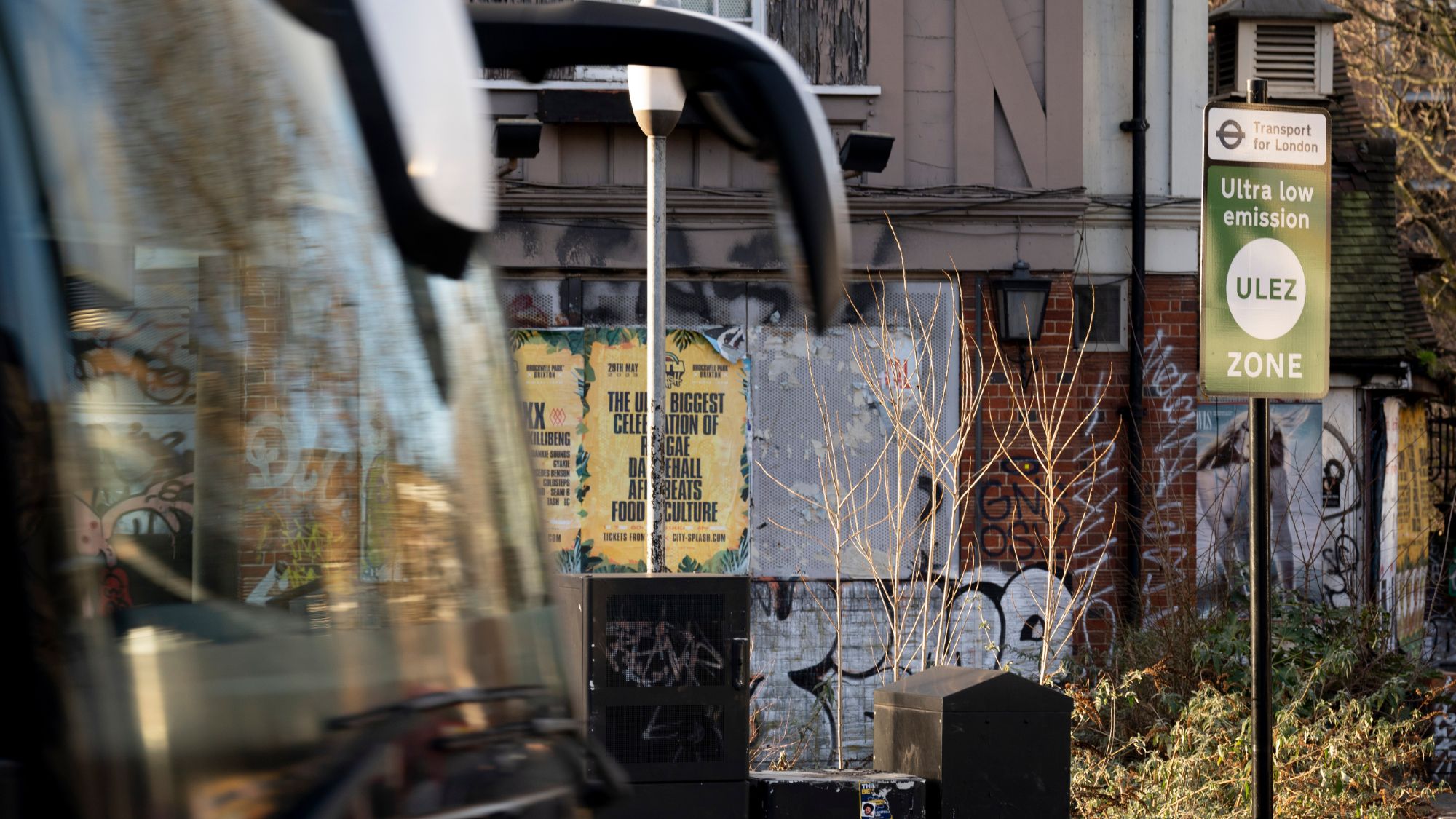
A sign indicating the ultra low emission zone in London
You say that you only became aware of air pollution and its effects aged 43, so why don't we talk about it more?
Because it's invisible. If you and I were sitting here in the 1950s, we would see the smog outside the window and we'd talk about it and what's causing it. But with air pollution today, you can't see it and you can't smell it. And that is the reason why with Rosamund’s permission I talk about Ella, because it humanises it. We all know someone who has asthma, if we don’t ourselves - you and I both have asthma. And my point is that if we had this same conversation 20 years ago that wouldn't be the case. So something has caused that, and what's caused that is the same thing causing climate change, which is air pollution. So we have got to talk about it, and I'm hoping to get the message and sense of urgency across by me telling my story.
It feels especially timely following the IPCC report that now is the time to act…
If I told you that your house was burning down, it would be illogical for you not to take action, right? And our planet is burning basically, so it's illogical for people not to take action. We've realised over the last few years that people haven't had a sense of urgency, and it's because it's been happening slowly over a long period of time. You mention the IPCC findings, but there have been a number of examples of equally worrying reports from experts where there hasn't been a sense of urgency. Just remember the 41°C temperatures last summer - people were literally overheating. Last year's wildfires led to the London Fire Brigade being the busiest it’s been since the Blitz. The year before we had flash flooding, where a number of our stations and tens of thousands of homes were flooded. We had massive floods in the Lake District in 2009 that at the time were called “floods of Biblical proportions” - they happen every two years now. So, it’s timely, but we could argue that it’s been timely for the last 5/ 10/ 15 years. But the point is, there is still a chance for us to do something about it.
Is it important for you to inspire people from a place of positivity rather than fear?
Spot on, that’s the book! You can scare people into action, but that's not my style, and that's also not my experience. I've been enthused and energised over the last few years because optimism is key and it is a hopeful story. In just two years we managed to reduce the toxic air in the centre of our city by 50%. In four years we planted more than two and a half times the trees than the previous guy did in eight - some guy called Boris Johnson. We have in just a short period of time increased five-fold the amount of cyclists. I’m not bragging - well actually I am, sorry, but it’s not for the sake of bragging. The point I'm trying to get across is that we can do it, we've shown we can bring about change and there are cities who are doing it around the world right now. To paraphrase Aretha Franklin and George Michael, “cities are doing it for themselves”.
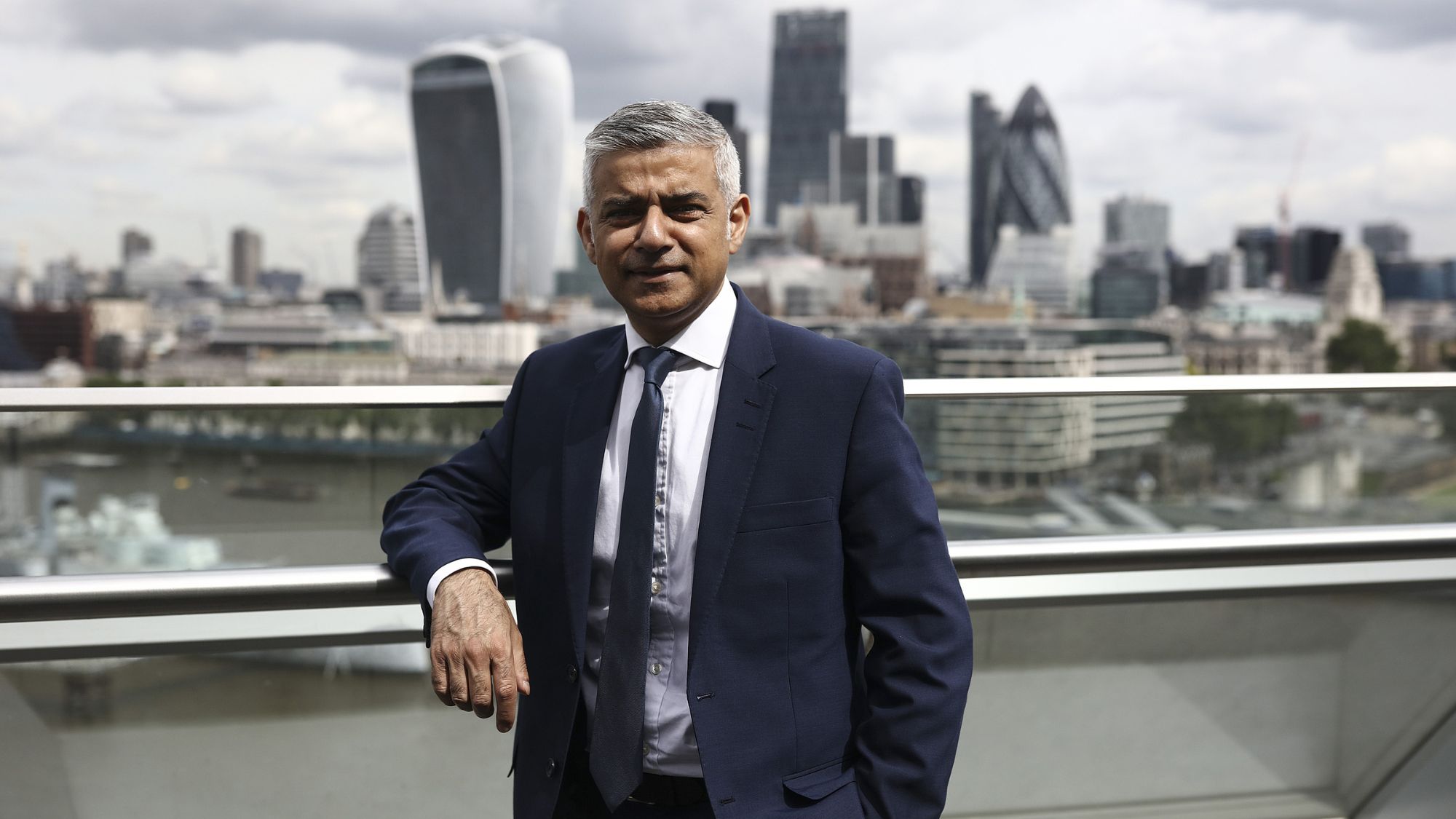
Sadiq Khan standing against a London backdrop
What is the greatest piece of advice you’ve ever received?
The best piece of advice I received was from my Dad. He once told me that it's really important that you work twice as hard to be considered half as good, and I still abide by that advice. It's advice that I know women and people from minority communities have received from their parents because often we do work incredibly hard and aren't recognised for doing so. There are no shortcuts - it's about hard work.
A question for all of our authors - what is your ultimate book recommendation?
I like to read for fun and escapism, so it's fiction. The Thursday Murder Club by Richard Osman is fantastic - all three of his books are great. Have you ever met Richard Osman? He’s three times my height and the loveliest man you'll ever meet, but also he's a genius. Richard is clearly somebody who has been given too much talent - I hate him. His books are so enjoyable. I better mention Elif Shafak as well otherwise she’ll kill me. She’s a great author - I love Elif as well.
Finally, what do you hope people take away from Breathe?
I was annoyed with myself because I didn't know about air pollution until it affected me directly. And my point was, if I didn't know, who else doesn't? So one thing I'm hoping the book does in a non-patronising way, is wake people up to what's going on. I want them to enjoy the book of course, but actually do they realise they could be doing something perfectly healthy - cycling their bike, going for a walk, and without knowing it they're breathing in poison? This book is a personal story but it's also a handbook. I know it’s a big task, but I want to turn passive consumers into active citizens - that's the prize.
Breathe: Tackling the Climate Emergency by Sadiq Khan, £16.99, published by Penguin, is available to buy now.

Jenny Proudfoot is an award-winning journalist, specialising in lifestyle, culture, entertainment, international development and politics. After working at Marie Claire UK for seven years - rising from intern to Features Editor - she is now a freelance contributor to the News and Features section.
In 2021, Jenny was named as a winner on the PPA's '30 under 30' list, and was also listed as a rising star in journalism.
